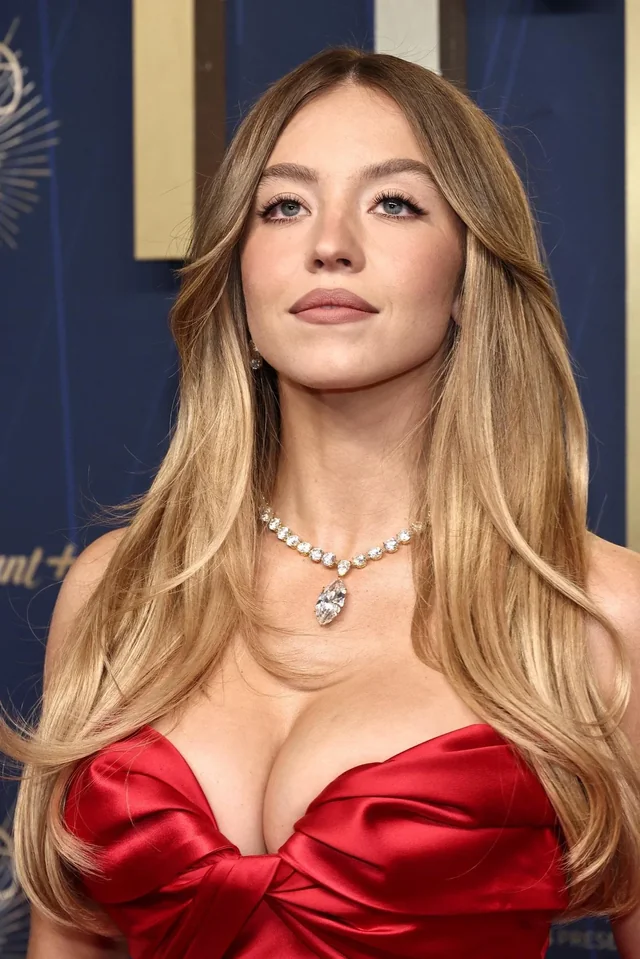

Emmy Host Makes Sydney Sweeney Embarrassed Before Red Carpet Moment With a Joke
At the 2025 Primetime Emmy Awards, a fleeting moment on stage captured more attention than many expected. Host Nate Bargatze made a comment referencing a “blue jean tux” just before Sydney Sweeney walked on to present Outstanding Supporting Actor in a Limited or Anthology Series or Movie. Given the recent controversy stirred by her American Eagle ad campaign, the line felt loaded. In the glare of live television, context matters—and in this case, that context gave the joke a sharper edge.
The Emmys Introduction That Sparked Speculation
When Sydney Sweeney’s time came, Bargatze opened with:
“I forgot — I have a blue jean tux on for some reason. We had, like, a joke — there’s a cummerbund, and I forgot what it… I don’t know. All right, please welcome two‑time Emmy nominee Sydney Sweeney.”
He then paused before introducing her, letting the “blue jean tux” line hang in the air. Sweeney walked onstage without responding to the comment. The audience saw her begin her presentation, and the moment passed — but many viewers sensed the reference was intentional, given the recent publicity around the “great jeans / great genes” campaign that featured her.

Background: The American Eagle “Great Jeans / Genes” Ad
Earlier in 2025, American Eagle launched an advertising campaign featuring Sydney Sweeney. The tagline “Sydney Sweeney Has Great Jeans” played with the wordplay between “jeans” (denim) and “genes” (hereditary traits). In commercials, visuals showed her in denim, with voice‑overs referencing traits passed down from parents, such as hair color or eye color, followed by Sweeney wearing blue jeans, in a statement like: “My jeans are blue.”
This campaign prompted a mix of praise and strong criticism. Some people argued it was a clever fashion ad; others claimed its language and imagery inadvertently evoked racial connotations, idealizing certain physical traits (blonde hair, blue eyes) in ways that many found tone‑deaf or insensitive. The controversy was amplified on social media, where users saw the “genes/jeans” pun as having deeper implications.
Brand Response & Public Debate
American Eagle later clarified its stance via official statements, emphasizing the campaign’s intention was about denim, fashion, and confidence. A common brand reply was: “Great jeans look good on everyone.” They claimed the focus was never about genetics, but about feeling comfortable and confident in their product.
Public debate grew rapidly. Some defended Sweeney, saying she was merely participating in a playful ad. Others saw the visuals and choice of phrases as problematic, citing historical precedents where beauty standards and genetic metaphors have been used in exclusionary or supremacist rhetoric. The discourse didn’t remain academic: it involved memes, late‑night commentary, opinion pieces, and strong emotions on both sides.
Why the Emmy Moment Resonated
The timing of Bargatze’s “blue jean tux” remark chimed too closely with this prior controversy to be dismissed by many. Viewers connected the “jean / genes” thread from the American Eagle campaign with the phrasing of the host. On live TV, small quips can become symbols. For many, this reference felt like a subtle echo—or perhaps a reminder—of the campaign argument.
Sydney Sweeney’s reaction (or lack thereof) added weight: she moved forward to present, without calling out the joke. That silence in public settings, especially award shows, is often interpreted as professionalism or strategy.
How Sydney Sweeney Handled It
When controversy blooms, the people in the center often face intense scrutiny. In this case, Sydney Sweeney kept her response minimal. She did not pause, reply, or publicly challenge the joke during the Emmys presentation. Instead, she presented the award and exited the stage, letting the moment settle into the overall narrative rather than becoming the headline. That kind of restraint can shape public perception: grace under pressure is proverbially powerful.
Her career momentum remains strong. She continues to attract roles in major television series and films, and her brand partnerships remain numerous, even amid critique. While some ad campaigns draw controversy, Sweeney appears to balance opportunity and risk with awareness of how public messaging matters.
The Stakes of Public Messaging & Celebrity Branding
In modern media, when a celebrity partners with a brand, every word, image, and metaphor is magnified. For Sydney Sweeney, the American Eagle ad campaign illustrated how fashion, marketing, and identity can cross invisible lines in public consciousness. A pun that seems innocent in boardrooms or creative meetings may take on layers of meaning once released into the social media ecosystem.
The Emmys moment shows that even subtle references or jokes about a previous campaign can reanimate controversy. Hosts, writers, and presenters on live televised events must consider how audience memory and cultural context shape interpretations. That “blue jean tux” line may have been intended as humor, but it reminded people of the earlier backlash.
Public Reaction: Mixed, but Meaningful
Since the Emmys aired, discussions have trended in many directions. Some praised Nate Bargatze’s line as sharp and witty—fitting for an award show that often riffs on recent pop culture moments. Others felt it was unnecessary, a jibe at Sweeney that put her on the defensive without warning.
Online commentary includes arguments that the joke was unfair, given Sweeney had already addressed much of the controversy with the campaign’s clarifications. Others defended the host, saying comedy and live hosting often involve timely references, even risky ones, and that context makes all the difference.

On the brand side, American Eagle has seen both consequence and commercial benefit. Reports indicate the campaign stirred record online traffic, increased social media impressions, and notably strong sales response, even if some brick‑and‑mortar foot traffic saw declines in certain metrics. The brand continues to use the phrase “great jeans” in marketing materials, and doubled down on messaging about inclusivity and confidence, claiming the ad was never about genetics.
Reflecting on the Bigger Picture: Culture, Humor, and Perception
This episode is about more than one joke or one campaign. It underscores how celebrity identity, branding strategy, and public perception intersect in ways that are unpredictable. Words with double meanings can be launched lightly, but received heavily.
For Sydney Sweeney, participating in the campaign meant entering deeper cultural waters than just fashion. For viewers and critics, it was a signal that marketing must be conscious of history, symbolism, and shifting societal norms.
For hosts like Nate Bargatze and award shows, it’s a reminder that introducing comedy into high‑visibility moments involves not just wit but careful awareness of recent controversies and audience position.
What Could Happen Next
As discussions around the campaign and the Emmy moment continue, several likely outcomes emerge. Sweeney may decide to clarify or articulate her position more publicly. Brands may reassess marketing copy with greater sensitivity checks. Producers and hosts might be more cautious about jokes that echo recent flashpoints in public consciousness.
Over the long term, this could influence how celebrity brand deals are handled: more focus on context, more understanding of unintended connotations, more proactive messaging. As for Sydney Sweeney’s image, skill and performance may continue to be what sustains her career, but moments like this emphasize how image and narrative also matter deeply.
Conclusion: A Moment That Speaks Volumes
What happened at the Emmys—a seemingly small joke, a line about “blue jean tux”—became a moment that spoke loudly because of everything behind it. The American Eagle ad campaign had already made certain cultural associations unavoidable. In that moment, the live TV introduction became another chapter in a story about words, implication, and identity.
Sydney Sweeney’s calm response, the backlash and defense, and the brand’s claimed intent show how complicated modern celebrity branding can be. Whether one thinks the joke was fair or not, it illustrated that no moment is too small when someone’s public image is already being discussed.
Ultimately, this episode reminds that public figures are always negotiating meaning: what they do, what others say about them, and how those actions are reflected back. Emmys appears to slip in subtle dig at Sydney Sweeney—but more than that, it reveals how sensitive the interplay of fashion, advertising, humor, and identity has become in our culture.


















